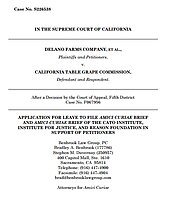Delano Farms Company v. California Table Grape Commission
Learn more about Cato’s Amicus Briefs Program.
The First Amendment of the U.S. Constitution and Article I of the California Constitution protect the freedom of speech. Although the most obvious form of violating free speech is when the government passes a law that restricts individuals’ speech, the government may also harm free speech rights when it speaks. The U.S. Supreme Court has long said that government should not stack the public debate in favor of its policy preferences. As the Court said in Hustler v. Falwell (1988), “it is a central tenet of the First Amendment that the government must remain neutral in the marketplace of ideas.” Nevertheless, the relatively new and very much evolving government speech doctrine threatens to alter the fundamental balance between citizens and the government. Under the government speech doctrine, if an entity can be classified as “the government” then its speech is relatively unencumbered. Naturally this means that all sorts of entities now claim to be “the government” in order to avoid First Amendment challenges to their actions, which is exactly what’s happening in Delano Farms v. California Table Grape Commission. The Commission has claimed that it is part of the government, its speech is “government speech,” and thus long-established concerns about compelled speech do not apply. But the Commission is not the government. It is a commercial entity that uses compelled subsidies to fund speech that imposes on First Amendment rights. The Commission’s generic advertisements for California grapes do not benefit the entire industry; rather, they benefit some members of the industry by making it seem that all products are equally good. Furthermore, the Commission cannot be considered the government because it, unlike the actual government, can be disbanded based on a vote of the table grape producers. In short, the Commission should not be given the protections of the government speech doctrine. The Cato Institute, the Institute for Justice, and the Reason Foundation have submitted an amicus brief to the California Supreme Court in support of Delano Farms. The brief urges the Court to tread lightly when considering any claim by an entity that the government speech doctrine insulates its actions. As Justice David Souter once stressed “because the government speech doctrine… is ‘recently minted,’ it would do well for us to go slow in setting its bounds, which will affect existing doctrine in ways not yet explored.” Expanding that doctrine threatens to alter California speech rights outside generic agricultural marketing as well. In a number of cases across the country, courts have considered how the government speech doctrine applies to ballot measures. Some have said that the doctrine permits government entities to speak on ballot issues free from First Amendment scrutiny, while others have observed that the use of tax dollars to advocate in elections distorts our political system. Unless the government speech doctrine is strictly limited more entities will continue to claim protected status, and individual voices will be drowned out. The California Supreme Court should ensure that the doctrine is limited to actual government entities and not just those that claim protection when it is convenient.

This work is licensed under a Creative Commons Attribution-NonCommercial-ShareAlike 4.0 International License.
